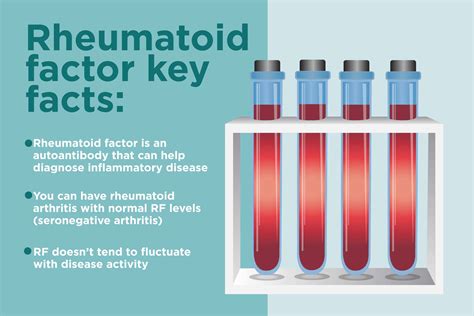Intro
Discover the role of Rheumatoid Factor in diagnosing autoimmune diseases, including rheumatoid arthritis, lupus, and Sjögrens syndrome, and learn about its testing, treatment, and management options.
Rheumatoid factor is a protein that can be found in the blood of individuals with certain medical conditions, particularly those affecting the immune system. It is an antibody that is produced by the immune system and is directed against the Fc portion of IgG antibodies. The presence of rheumatoid factor in the blood can be an indicator of various health issues, including rheumatoid arthritis, lupus, and other autoimmune diseases. Understanding what rheumatoid factor is, how it is tested, and what its implications are can provide valuable insights into the diagnosis and management of these conditions.
The immune system plays a crucial role in protecting the body against infections and diseases. However, in some cases, the immune system can become overactive or misdirected, leading to the production of antibodies that attack the body's own tissues. Rheumatoid factor is one such antibody that can be produced in response to certain stimuli, including infections, inflammation, and other immune system disorders. The presence of rheumatoid factor in the blood can be a sign of an underlying autoimmune condition, and its detection can be an important diagnostic tool.
Rheumatoid factor is not exclusive to rheumatoid arthritis, and its presence can be found in other conditions as well. For example, it can be present in individuals with lupus, scleroderma, and other autoimmune diseases. Additionally, rheumatoid factor can be detected in people with chronic infections, such as hepatitis and tuberculosis. The presence of rheumatoid factor in these conditions can indicate a complex immune system response, and its detection can be an important factor in diagnosis and treatment.
Rheumatoid Factor and Rheumatoid Arthritis

The relationship between rheumatoid factor and rheumatoid arthritis is complex, and the exact mechanisms by which rheumatoid factor contributes to the disease are not fully understood. However, research suggests that rheumatoid factor may play a role in the initiation and progression of the disease. For example, rheumatoid factor can bind to IgG antibodies, forming immune complexes that can deposit in the joints and other tissues, leading to inflammation and damage.
Types of Rheumatoid Factor
There are several types of rheumatoid factor, including IgM, IgG, and IgA rheumatoid factor. Each type of rheumatoid factor has different properties and is associated with different conditions. For example, IgM rheumatoid factor is the most common type and is often associated with rheumatoid arthritis. IgG rheumatoid factor is less common and is often associated with other autoimmune diseases, such as lupus.The detection of rheumatoid factor can be performed using various laboratory tests, including enzyme-linked immunosorbent assay (ELISA) and Western blot. These tests can detect the presence of rheumatoid factor in the blood and can provide valuable information for diagnosis and treatment.
Rheumatoid Factor Testing

The interpretation of rheumatoid factor test results can be complex, and should be considered in conjunction with other diagnostic criteria. For example, a positive test result can indicate the presence of rheumatoid factor, but may not necessarily confirm a diagnosis of rheumatoid arthritis. Additionally, a negative test result does not rule out the presence of rheumatoid arthritis, as some individuals with the disease may not produce rheumatoid factor.
Interpretation of Test Results
The interpretation of rheumatoid factor test results requires careful consideration of various factors, including the type of test used, the level of rheumatoid factor detected, and the presence of other diagnostic criteria. For example, a high level of rheumatoid factor may indicate a more severe disease, while a low level may indicate a milder disease. Additionally, the presence of other antibodies, such as anti-CCP antibodies, can provide valuable information for diagnosis and treatment.The detection of rheumatoid factor can have significant implications for diagnosis and treatment. For example, individuals with a positive test result may require further evaluation and treatment, including medication and lifestyle changes. Additionally, the presence of rheumatoid factor can indicate a higher risk of developing other autoimmune diseases, such as lupus and scleroderma.
Rheumatoid Factor and Other Autoimmune Diseases

For example, lupus is a chronic autoimmune disease that can affect various tissues and organs, including the skin, joints, and kidneys. Rheumatoid factor can be present in individuals with lupus, and its detection can provide valuable information for diagnosis and treatment. Similarly, scleroderma is a chronic autoimmune disease that affects the skin and other tissues, and rheumatoid factor can be present in individuals with this condition.
Implications for Diagnosis and Treatment
The presence of rheumatoid factor in individuals with other autoimmune diseases can have significant implications for diagnosis and treatment. For example, the detection of rheumatoid factor can indicate a more severe disease, and may require more aggressive treatment. Additionally, the presence of rheumatoid factor can indicate a higher risk of developing other autoimmune diseases, and may require closer monitoring and follow-up.The management of rheumatoid factor-positive individuals requires a comprehensive approach, including medication, lifestyle changes, and regular monitoring. For example, individuals with rheumatoid arthritis may require disease-modifying antirheumatic drugs (DMARDs) to slow disease progression and reduce inflammation. Additionally, lifestyle changes, such as exercise and stress reduction, can help to manage symptoms and improve quality of life.
Management and Treatment

Medications, such as DMARDs and biologics, can help to reduce inflammation and slow disease progression. Additionally, lifestyle changes, such as exercise and stress reduction, can help to manage symptoms and improve quality of life. Regular monitoring, including laboratory tests and clinical evaluations, can help to track disease progression and adjust treatment as needed.
Lifestyle Changes and Self-Management
Lifestyle changes and self-management can play an important role in managing rheumatoid factor-positive individuals. For example, regular exercise can help to reduce inflammation and improve joint mobility. Additionally, stress reduction techniques, such as meditation and yoga, can help to manage stress and improve overall well-being.A healthy diet, including a balanced intake of fruits, vegetables, and whole grains, can help to reduce inflammation and improve overall health. Additionally, avoiding triggers, such as certain foods and environmental toxins, can help to reduce inflammation and improve symptoms.
What is rheumatoid factor?
+Rheumatoid factor is a protein that can be found in the blood of individuals with certain medical conditions, particularly those affecting the immune system.
What is the relationship between rheumatoid factor and rheumatoid arthritis?
+Rheumatoid factor is present in the blood of approximately 80% of individuals with rheumatoid arthritis, making it a useful diagnostic tool.
How is rheumatoid factor tested?
+Rheumatoid factor testing is typically performed on a blood sample and can detect the presence of rheumatoid factor using various methods, including ELISA and Western blot.
What are the implications of a positive rheumatoid factor test result?
+A positive test result can indicate the presence of rheumatoid factor, but may not necessarily confirm a diagnosis of rheumatoid arthritis.
How is rheumatoid factor managed and treated?
+The management and treatment of rheumatoid factor-positive individuals requires a comprehensive approach, including medication, lifestyle changes, and regular monitoring.
In conclusion, rheumatoid factor is a complex and multifaceted topic that requires careful consideration of various factors, including diagnosis, treatment, and management. By understanding the role of rheumatoid factor in autoimmune diseases, individuals can better manage their symptoms and improve their quality of life. If you have any questions or concerns about rheumatoid factor, we encourage you to comment below or share this article with others who may be interested. Additionally, if you are experiencing symptoms of rheumatoid arthritis or other autoimmune diseases, we recommend consulting with a healthcare professional for proper diagnosis and treatment.
